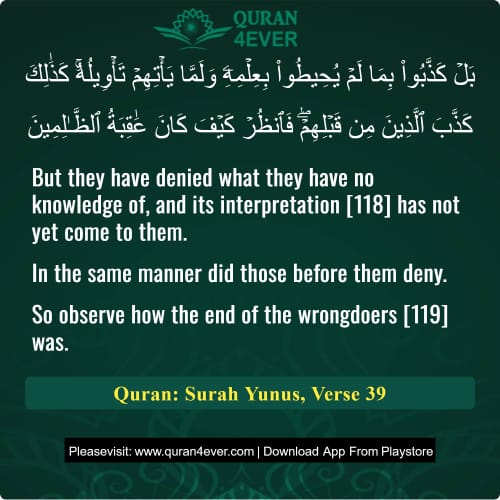
Transliteration:( Bal kazzaboo bimaa lam yuheetoo bi'ilmihee wa lammaa ya'tihim ta'weeluh; kazaalika kazzabal lazeena min qablihim fanzur kaifa kaana 'aaqibatuz zaalimeen )
"But they have denied what they have no knowledge of, and its interpretation [118] has not yet come to them. In the same manner did those before them deny. So observe how the end of the wrongdoers [119] was."
The disbelievers deny the Qur'an without understanding it, often due to blind following of their forefathers or because of their inability to comprehend its divine wisdom. This rejection stems from their ignorance and lack of reflection. The verse highlights the failure of the disbelievers to consider the profound truth of the Qur'an, making it clear that their denial is not based on sound reasoning.
The Qur'an is a miracle in its eloquence, rhetoric, and prophetic knowledge, which cannot be fully grasped by human intellect or wisdom alone. It holds prophetic information that only unfolds over time, making it a test of faith. If the disbelievers had waited for the unfolding of these prophecies, they would have realized the divine truth of the Qur'an. Their denial stems from their impatience and lack of understanding of the timing and wisdom in divine revelation.
The verse reminds the disbelievers to observe the fate of previous wrongdoers who rejected the truth and suffered the consequences. It serves as a warning that their end will be similar if they persist in their rejection of the Qur'an. This highlights the importance of learning from history and understanding the consequences of denying divine truth. The principle of analogy is affirmed: those who reject divine guidance and warnings are bound to face the same punishment as the previous disbelievers.
The tafsir of Surah Yunus verse 39 by Ibn Kathir is unavailable here.
Please refer to Surah Yunus ayat 37 which provides the complete commentary from verse 37 through 40.
(10:39) In fact they arbitrarily rejected as false whatever they failed to comprehend and whose final sequel was not apparent to them.[47] Likewise had their predecessors rejected the truth, declaring it falsehood. Do observe, then, what was the end of the wrong-doers.
47. They could declare the Quran as forged on two grounds only, but neither of these existed: First, if they had had a proof that the Book had not been revealed by Allah, but had been forged by someone; secondly, that the truths enunciated in it and the information given in it were false. But no one could say on the basis of true knowledge that the Book had been really forged and then ascribed to God: nor could anyone say that he had peeped behind the curtains of the unseen and discovered that there was not One God (as taught in this Book) but many gods in the heavens: nor could anyone assert on the basis of true knowledge that there were no angels, no revelations and no God, but these were mere fictions that had been invented by some fertile imagination: nor had anyone witnessed by actually visiting the Hereafter that the information about rewards and punishments was utterly wrong. But in spite of the lack of any proof to the contrary; they were challenging the genuineness of the Quran with the boldness and impudence of one who had made a thorough research into the matter and proved it to be false.

For a faster and smoother experience,
install our mobile app now.
Related Ayat(Verses)/Topics